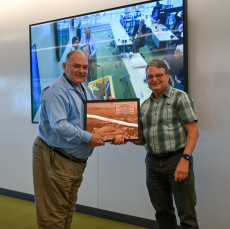Celebration Spotlights Phil Colella’s Remarkable DOE Career
May 15, 2024
By Linda Vu
Contact: cscomms@lbl.gov
On April 19, applied mathematician Phillip Colella’s colleagues, collaborators, mentors, and mentees convened at Berkeley Lab’s Wang Hall to celebrate an illustrious career that has spanned more than four decades and includes formative contributions to the Department of Energy’s (DOE’s) applied mathematics and computing programs, as well as the fields of applied math, computational science, and engineering.
Colella has been a mainstay in Berkeley since the mid-1970s, earning his bachelor’s (1974), master’s (1976), and Ph.D. (1979) degrees in applied math from UC Berkeley. He began his research career at Berkeley Lab shortly after receiving his doctorate and has spent most of his career here. He was also a staff scientist at Lawrence Livermore National Laboratory and a UC Berkeley Mechanical Engineering Department professor.
In his opening remarks, Jonathan Carter, Associate Laboratory Director for Computing Sciences at Berkeley Lab, said: “When I think of Phil, three main themes come to mind: thought leader, outstanding science, and tenacious advocate.”
To encapsulate Colella as a thought leader, Carter recalled an event decades ago when Colella presented an idea to isolate motifs (common patterns of computation and communication in simulation and data-analysis programs) from applications, develop and build on those motifs and then make them available as targets for research into improved architectures and algorithms.
“Phil’s idea of the motifs made a big impression on me when I worked at NERSC, and it has been essential for delivering on the promise of DOE’s cutting-edge petascale and exascale supercomputers,” said Carter.
Along the same vein, he also reminisced about an event more recently when Colella “tenaciously advocated” for having better Fast Fourier Transforms (FFTs) that would be widely useful for applications in science and engineering as part of the Exascale Computing Project.
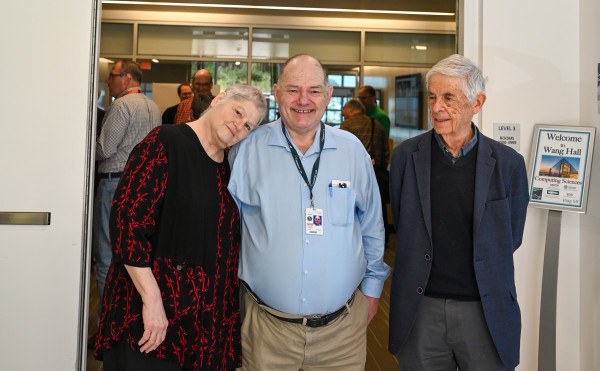
Phillip Colella (center), his wife Susan Londerville (left), and his mentor Alexandre Chorin.
Berkeley Lab’s Applied Numerical Algorithms Group Lead, Dan Martin, echoed these sentiments, noting that “exposing the commonality of what people are already working on helped the computational science community see a bigger picture.”
“The Exascale Computing Project’s Co-Design Centers are a great example of this concept in action. These centers accelerate discovery because people in different fields don’t have to constantly reinvent the same wheel. The impact on science is epitomized by tools like AMReX (AMR for the Exascale), which has been used to model a range of science from wind turbines to supernovae and is being incorporated into several Earthshot projects,” added Martin, Colella’s former student and mentee, then Berkeley Lab colleague.
Over the last 40-plus years, Colella has worked on developing high-resolution and adaptive numerical algorithms for partial differential equations and numerical simulation capabilities for various applications in science and engineering. He also participated in the design of high-performance software infrastructure for scientific computing, including software libraries, frameworks, and programming languages. He is the author or co-author of 92 peer-reviewed papers published in journals and 59 papers published by conferences.
Contributions to Outstanding Science and Scientists
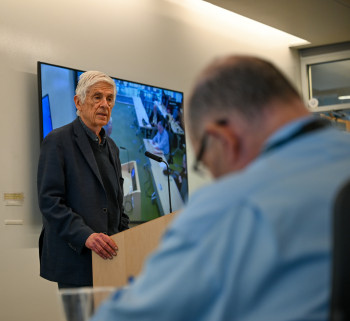
Alexandre Chorin reminisces about his former student Phillip Colella.
One measure of the impact of his contributions is the number of prestigious accolades that have been bestowed upon him over the years, including the IEEE Sidney Fernbach Award for high-performance computing in 1998, the SIAM/ACM prize (with John Bell) for computational science and engineering in 2003, election to the US National Academy of Sciences in 2004, election to the inaugural class of SIAM Fellows in 2009, and the Berkeley Lab Lifetime Achievement Award in 2018.
But many at the event recalled another measure of his impact on science and their research: witticisms and “pearls of wisdom” gleaned from regular weekly meetings at Peets Coffee, discussions at the whiteboard, and informal conversations in Colella’s office that they carried with them throughout their careers.
Former Berkeley Lab Scientist Scott Baden recalled meeting Colella in the formative years of his education. “What I learned from Phil was to see things as they were, not to decide how I wanted them to be. In other words, I looked at the properties of the problems that I was solving and used that knowledge to explain how I would go about employing them,” he said. “And that was all of the direction he needed to give me; he didn’t tell me how to go about it; I figured that out myself. But he was always there to provide me with the guidance that I needed.”
Martin reminisced about when Prateek Sharma, previously an astrophysics researcher at UC Berkeley, reached out to him about errors in his simulations of cosmic rays — no one could understand what was going wrong. “We were able to look at this problem and see that the application was a diffusion equation masquerading as a transport equation; once we diagnosed the problem, Phil was able to come up with a different approach that turned out to be something of a seminal work in cosmic rays,” said Martin. “This was a minor thing that showcased his gifts. To this day, it remains one of my most cited papers.”
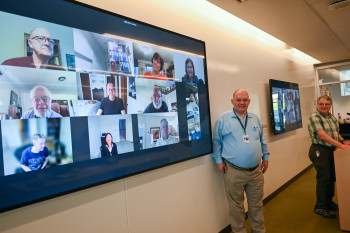
Colella, pictured with colleagues, collaborators, and mentees who attended the event virtually. (Photo by Bonnie Powell, Berkeley Lab)
Marsha Berger, a professor at the Courant Institute of Mathematical Sciences of New York University, recalled that “Phil was the first person I collaborated with in my now 40-year career, and he was a great one to start with. Other people I’d met had some problems working with women, but not Phil. I have fond memories of debugging sessions in his office at Berkeley Lab. ‘Just one more run’ was the mantra, even as we (really me) were so tired. But Phil kept going, and I would rouse myself enough for us to discuss the next run’s results. Wish I had that kind of stamina now.”
Colella and Berger’s pioneering 1989 paper, “Local adaptive mesh refinement for shock hydrodynamics,” published in the Journal of Computational Physics, describes applying adaptive mesh refinement (AMR) to determine the shape of a shockwave bouncing off a hard surface and has been cited well over 3,000 times as a foundational work in AMR.
Outstanding Mentorship, Lifelong Friends
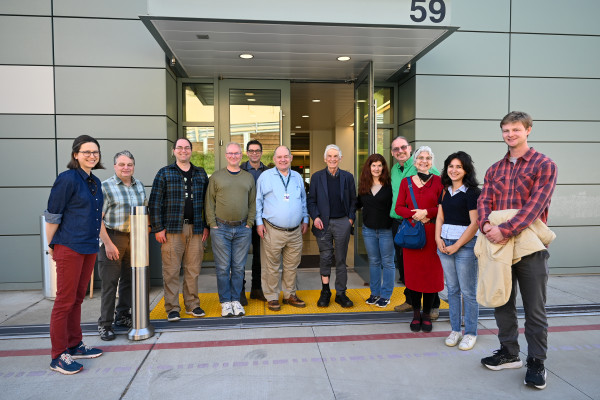
Phillip Colella (center) and his mentor, Alexandre Chorin (center right), are flanked by Colella’s students.
Beyond his scientific contributions, another recurring theme of the day was Colella’s patience and penchant for mentoring the next generation of researchers.
“One theme that has resonated with me is just how caring Phil is and how willing he is to take a chance on folks and really nurture them — that was certainly the case with me,” said Marissa Ramirez de Chanlatte, a UC Berkeley Graduate Student Researcher and Colella’s current student.
“I was at the lowest point in my academic career, and someone told me, ‘Go talk to Phil.’ He sat down in a cafe with me at Etcheverry Hall, so free of judgment and completely understanding of what I was going through. He said, ‘Come work with me,’ and has shepherded me ever since and pulled me toward the finish line,” added Ramirez de Chanlatte, who will graduate with her Ph.D. in May.
Christine Chalk, a program manager with DOE’s Office of Advanced Scientific Computing Research (ASCR), also recalled Colella’s patience early in her career:
When I first became a program manager at ASCR, Phil was very kind to me and very patient with all of my questions and the fact that I was drinking from a firehose and didn’t know the ASCR community or what I needed to know as a program manager. He’s one of the people I keep in mind as new program managers come in, and I try to mentor them and help them grow in their careers and pay it forward. He taught me so much, and I am really grateful.”
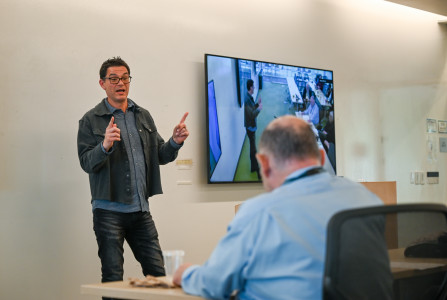
Berkeley Lab Scientist David Trebotich reminisces about his mentor, Phillip Colella.
Other former students and colleagues remembered how he used to babysit their children, hosted rousing summer parties, shared his knowledge about French pastries and Italian Opera, and even how his adaptive mesh refinement work inspired the character of Bobby Chombo in William Gibson’s 2007 novel Spook Country.
“I’ve been looking forward to this day in one respect: it’s an opportunity for me to acknowledge my debts to a career’s worth of colleagues. They’ve all been my friends, and I’ve spent a lifetime with them. They’ve all taught me and supported me in very specific ways,” said Colella, who closed out the celebration by thanking his mentor, Alexandre Chorin, his collaborators, managers, students, and wife, Susan Londerville, and detailing their impact on his life inside and outside of academia and research.
About Berkeley Lab
Founded in 1931 on the belief that the biggest scientific challenges are best addressed by teams, Lawrence Berkeley National Laboratory and its scientists have been recognized with 16 Nobel Prizes. Today, Berkeley Lab researchers develop sustainable energy and environmental solutions, create useful new materials, advance the frontiers of computing, and probe the mysteries of life, matter, and the universe. Scientists from around the world rely on the Lab’s facilities for their own discovery science. Berkeley Lab is a multiprogram national laboratory, managed by the University of California for the U.S. Department of Energy’s Office of Science.
DOE’s Office of Science is the single largest supporter of basic research in the physical sciences in the United States, and is working to address some of the most pressing challenges of our time. For more information, please visit energy.gov/science.









